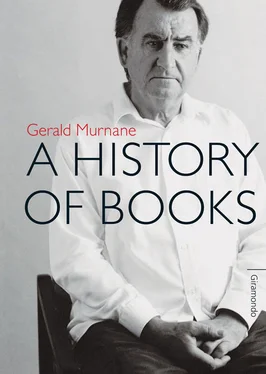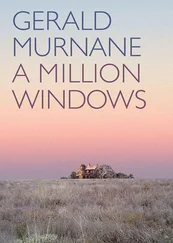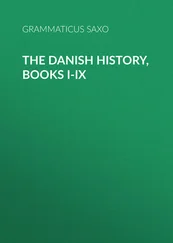The Reformed Gambler has no further part in this piece of fiction, but I would like to report here that he lived a long life and that he spent much of his time in later life far from his wife and son and in the company of congenial relatives of his.
The person who looked down her nose sometimes I shall call hereafter the Holy Foundress. I call her this not only because she had founded the Farm, but because I believe she would have been, in many an earlier period of history, the foundress of a religious order dedicated to one or another special task within the Church; would have written without help from any advisor the compendious Rule and Constitution of the Order; would have travelled to Rome under trying conditions; would have gained at last official approval for her new order; and would have died long afterwards in what was called in earlier times the odour of sanctity.
My father had warned me before he left me there that I must not ask questions about what he called past goings-on at the Farm. I asked no questions, but I saw much evidence that the Farm had been, until recently, a small farm with a few dairy cows. I guessed that the cows had been milked and other farming tasks performed by the five of six male persons who had slept in the wing of the house which was obviously a later addition and which Nunkie sometimes called absently the boys wing. I guessed that the boys, whoever they had been, had attended daily mass every morning in the bluestone chapel that was always locked whenever I tried the door but which Nunkie unlocked for me one afternoon, after I had questioned him about the chapel yet again, so that I was able to look at the empty seats and the bare altar and the cupboard where the priest’s vestments had been stored and at the windows of orange-gold frosted glass that made a mystery of each view of trees or sky outside the place.
At the age of eleven, I never doubted that I would live for the rest of my life as a faithful Catholic, but I found it tedious to sit each Sunday in a parish church crowded with parents and their squirming clusters of children; to hear the priest preaching that the parish school needed money for an extra classroom; to read in the Catholic newspaper that the archbishop had made a speech attacking communist-controlled unions after he had blessed and opened a new church school building in a faraway outer suburb where the streets were dust in summer and mud in winter. From here and there in my reading, I had put together a collection of expressions that inspired in me what I supposed were pious feelings: private oratory; private chaplain; gothic chasuble; jewelled chalice; secluded monastery; strict observance . I seem to have been dreaming of a private place where I could enjoy my religion with a few like-minded persons. At the centre of the place was, of course, the oratory or chapel, but I was also concerned that the place should be surrounded by an appropriate landscape.
After I had been at the Farm for a few days, I heard for the first time about Outlands. The day was a Sunday, and a visitor from Outlands had arrived for the midday meal. The visitor was a young man perhaps not yet thirty years of age. He was pale and rather plump, and I was surprised when I learned that he came from a settlement of farmers but very interested when I saw that the newspaper he carried with his luggage was in a foreign language. Before I could learn much about the man or about Outlands, my father arrived to take me for a walk and to tell me news of our family.
While I walked with my father, I tried to learn what he might have known already about the Farm and about Outlands. My father would tell me only that Nunkie and his parents had been very kind to take me in but that I must not let them turn me into a religious maniac. My father, who could well be called for the purposes of this piece of fiction the Unreformed Gambler, was a Catholic in the same way that the Reformed Gambler was a Catholic. My father went to mass every Sunday and to confession and communion once each month and seemed to suspect the motives of any Catholic who did any more than this.
While we walked on the Sunday, my father told me that he knew about Outlands only that it was doomed to fail, just as the Farm had failed. Such places always failed, my father said, because their founders were too fond of giving orders and not prepared to listen to advice. He then told me that the Farm had been intended by its founder, the person called in this fiction the Holy Foundress, to be a place where a few men who had recently completed long terms of imprisonment could live and work and pray while they prepared themselves to find homes and jobs in the world at large. The Farm, my father reminded me, was only a few tram stops away from the large prison where he himself had been a warder when I was born and where he had learned, as all the other warders, his mates, had learned, that almost every person who had been imprisoned for a long term was by nature the sort of person who would be later imprisoned again.
My father had ceased to be a prison warder in one of the first years after I was born, but he had remained friends with many warders. He told me on our Sunday walk, in the streets of the suburb where the Farm was at the end of the tramline that passed the front gate of the large prison, that all the warders who had heard of the founding of the Farm had predicted that the Farm would fail and that the warders’ predictions had been fulfilled. The Farm had failed, my father said, because most of the men who had gone from the prison to the Farm had not been reformed but had gone on planning — and even committing — further crimes while they lived at the Farm.
My father told me the story of the Farm with seeming relish, but I tried while he talked to compose in my mind arguments in defence of the Farm. I had lived at the Farm for only a few days, but each morning I had gone with Nunkie and his son, my cousin, and the Holy Foundress to early mass in the semi-public chapel of a nearby convent; each evening I had prayed with the others at dusk in the room where the big bookcase stood; each day I had walked between the fruit trees for ten minutes, imitating the even paces of one or another priest I had once seen walking on the paths around his presbytery while he read the divine office for that day. Perhaps I was discovering the power of ordered behaviour, of ritual. Perhaps I was merely devising for myself one more of the imagined worlds I had devised throughout my childhood. Although I was hardly fond of the Holy Foundress, I admired her for having tried to set up what I thought of as a world of her own, a world apart from or concealed within the drab world that most people inhabited, a small farm almost surrounded by suburbs.
My own imagined worlds before then had been located each on an island of the same shape as Tasmania, which was the only suitable island I knew of. The people of those worlds had been devoted to cricket or to Australian Football or to horse-racing. I had drawn elaborate maps showing where the sportsgrounds or racecourses were situated. I filled pages with coloured illustrations of the football jumpers of the many teams or of the coloured caps of the cricket teams or of the racing silks of the racing stables. I had spent so much time in preparing these preliminary details for each of my imagined worlds that I had seldom got as far as to work out results of imagined football or cricket matches or of imagined horse-races.
I had destroyed or lost all the pages showing the details mentioned above, but sometimes during the year before I arrived at the Farm I had felt a peculiar longing and had wanted my adult life to be so uneventful and my future home to be so quiet and so seldom visited that I could spend most of my life recording the details of an imaginary world a hundred times more complicated than any I had so far imagined.
Читать дальше












